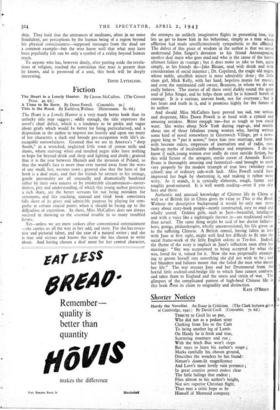Fiction
The Heart is a Lonely Hunter. By Casson McCullers. (The Cresset Press. 9s. 6d.)
A Time to Be Born. By Dawn Powell. (Constable. 9s.)
This is the Road. By Kathleen,Wallace. (Heinemann. 8s. 6d.) The Heart.is a Lonely Hunter is a very much better book than its unlucky title may suggest ; oddly enough, the title expresses the novel's chief defect, which is a tendency to be prolix and vague about griefs which would be better for being particularised, and a disposition in the author to impresi too heavily and upon too many of her characters a slack and broody pre-occupation with life's in- escapable sorrowfulness. Granted that we are in America's " deep South," in a wretched, neglected little town of cotton mills and slums, where starving white and insulted negro alike have nothing to hope for beyond drink and sleep and fighting and death ; granted that it is the year between Munich and the invasion of Poland, so that the world's face is more than ever turned away from the woes of one small, lost, western town ; granted also that the hero of the book is a deaf mute, and that the friends he attracts to his strange, gentle personality are all unusually and dramatically burdened either by their own natures or by intolerable circumstances—never- theless, pity and understanding, of which this young author possesses a rich share, are the better servants for not being mistaken for synonyms, and this touching, unusual and vivid . book sometimes falls short of its grave and admirable purpose by playing for sym- pathy at certain crucial points when it should be facing up to the difficulties of exposition. In short, Miss McCullers does not always succeed in showing us the essential trouble in so. many troubled hearts.
Yet—unless we are mere seekers after conventional entertainment —she carries us all the way in her odd, sad story. For she has evoca- tive and pictorial talent, and the ease of a natural writer ; and she is true and serious and knows the scene she has chosen to write about. And having chosen a deaf mute for her central character,
she attempts no unlikely imaginative flights in presenting him, but lets us get to know him in his behaviour, simply as a man whom affliction had made unselfconsciously sympathetic to the afflicted. The defect of this piece of wisdom in the author is that we never understand John Singer's devotion to his friend Antonapoulos, another deaf mute who goes mad and who is the cause of the hero's ultimate failure in courage; it does make us take to him, quite simply, as his friends do—Jake Blount, mad with drink and with consideration of social injustice ; Dr. Copeland, the tragic old negro, whose noble, unselfish misery is most admirably done ; the little slum girl, Mick Kelly, with her hard, hopeless mania for music ; and even the sentimental café owner, Brannon, in whom we do not really believe. The stories of all these swirl darkly round the quiet soul of John Singer, and he helps them until he is himself bereft of courage. It is a curious, uneven book, not for everyone • but it has heart and truth in it, and it promises highly for the fintire of its author.
And should Miss McCullers have proved too sad, too serious and desperate, Miss Dawn Powell is at hand with a cynical and amusing antidote. Bitter enough too—but as tough as you could want. She writes about New York during 1940-41, and mainly about one of those fabulous young women who, having written some kind of novel somewhere in Greenwich Village, get a news- paper king to " put it across," force him into marriage, and forth- with become rulers, empresses of journalism and of radio, rare, built-up myths of incalculable influence and emptiness. I do not know if such. young women ,ever really do exist outside fiction, but this wild fiction of the arrogant, sterile career. of Amanda Keeler Evans is thoroughly amusing and fantastical—and brought to earth very properly by the modest triumph of true love (whiskey sour school) ana of ordinary side-walk luck. Miss Powell could have improved her bopk by shortening it, and making it rather more witty. As it stands, it is cynically elaborate, rough, funny and toughly good-natured. It is well worth reading—even if you skip here and there.
Authentic and unusual knowledge of Chinese life in China as well as of British life in China gives its value to This is the Road. Without the descriptive background it would be only one more story about story-book people—neatly constructed, easy to read and wholly unreal. Golden girls, such as Jane—beautiful, intelligent and with a voice like a nightingale thrown in—are traditional rather than actual. The same thing might be said of her doctor father— hero genius, philanthropist, wholly unconventional, his life given up to the suffering Chinese. A British consul, having fallen in love with Jane at first sight, might well find her difficult to fit into the social frame-work of the little English colony at Ter-hoi. Indeed, the theme of the story is implicit in Jane's reflection soon after her marriage : " She was accustomed to being accepted for what she was, loved for it, valued for it. Now she was perpetually attempt- ing to groom herself into something she did not wish to be ; and her blunders and failures meant that she failed the man who meant her life." The war rescues Jane and her Drummond from the horrid little cocktail-and-bridge life to which lane cannot conform, and takes them to England and the stress and strain of war. The glimpses of the complicated pattern of high-bred Chinese life in this book ftrrn its claim to originality' and distinction.
- KATE O'BRIEN.


























 Previous page
Previous page